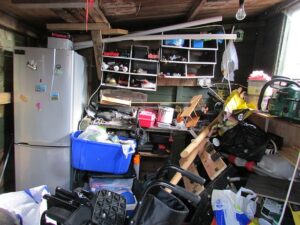We humans are acquisitive beings who surround ourselves with ‘stuff’. Beloved comedian George Carlin entertained audiences with his routine on that topic. (Warning. George uses another ‘s’ word to describe stuff.) We collect items that show the world who we are and what we value. Take a moment to look around the room where you are sitting. What do you see? Is your space neat and orderly, even Zen simplistic? Or cluttered and chaotic? You may remember the photo of Albert Einstein’s desk, taken after his death, that was piled high with papers and books. It is notable that this genius was able to accomplish all that he did, surrounded by mess and mayhem.
 For most of us, having an organized living and work space helps to create healthy habits in all areas of our lives and can assist us in clearing the clutter in our minds.
For most of us, having an organized living and work space helps to create healthy habits in all areas of our lives and can assist us in clearing the clutter in our minds.
Singer songwriter David Wilcox penned a song called Empty Out the Inside of My Head that succinctly expresses the importance of clearing the mental mish mosh.
“I got such a mess between my ears Like dishes in the sink Stuff I don’t believe just tumbles in Until I don’t have room to think.”
A 2010 study published in Personality and Social Psychology Bulletin measured the way 60 subjects discussed their homes. Women who described their living spaces as “cluttered” or full of “unfinished projects” were more likely to be depressed and fatigued than women who described their homes as “restful” and “restorative.” The researchers also found that women with cluttered homes expressed higher levels of the stress hormone cortisol.
In 2011, researchers at Princeton University found that clutter can actually make it more difficult to focus on a particular task.
Clutter can contribute to anxiety as you may scramble to find something that is needed immediately such as car keys or important paperwork that has a deadline.
Clutter can also be a distraction when trying to accomplish tasks. A grad school student described her method of doing homework after a long day in classes. She said that before she could crack open a book, she needed to clear off the kitchen table and do dishes that were left in the sink. Then she noticed that the floor needed to be vacuumed. Before she knew it, an hour had passed, and she still hadn’t started her studies.
The therapist that she became learned a method that serves her and her clients to this day. It saves time and improves concentration. She calls them the Four House Rules.
- If you open it, close it.
- If you take something out, put it back.
- If you drop something, pick it up.
- If you make a mess, clean it up.
